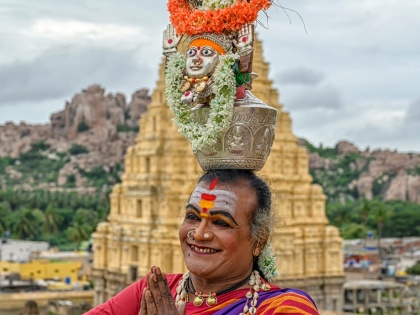Padma Shri awardee trans woman Manjamma Jogati’s inspiring tale
By Anubha Jain | Published: April 25, 2022 01:57 PM2022-04-25T13:57:28+5:302022-04-25T13:58:27+5:30
At the age of 18, Panchayat sabha and a priest of the village suggested Manjamma's parents for allowing Manjamma ...

Padma Shri awardee trans woman Manjamma Jogati’s inspiring tale
At the age of 18, Panchayat sabha and a priest of the village suggested Manjamma's parents for allowing Manjamma aka Manjunatha Shetty to lead a life of Jogati where the child/person is given to Renuka Yellamma deity. The child or that person stays away from home and worships goddess Yelamma, does begging to survive, through the folk-dance form praises and talks about the goddess and their pain to the masses. Transgender, the third gender is an umbrella term that describes people who have a gender identity that differs from the sex that they were assigned at birth. A transgender may identify as a woman despite having been born with male genitalia. There are exceptions everywhere and one such phenomenal soul I met in Bengaluru was Manjamma Jogati, the first trans woman in the country who is the President of the Government of Karnataka’s Janapada Academy since 2019. She was felicitated with the honour of Padma Shri by the President of India Ramnath Kovind in 2021 at Rashtrapati Bhavan in New Delhi for her incredible efforts in the domain of North Karnataka, South Maharashtra, and a part of Andhra Pradesh’s famous Jogathi Folk Dance forms. For the last 40 years, Amma is in the profession of folk dancing.
People fondly call her ‘Amma’. Always a big red bindi on the forehead with sindoor, simplicity on the face, pattu cotton saree, countless glass bangles with a fascination for gajara (flowers) in the hair are Amma’s style statements. Today with her 11 members team, Amma through her registered trust - Padmashri Mata B Manjamma Jogathi Pratistana aims to work for the community, train Trans men and women in Folk art forms, offer skill development training, provide shelter to old age trans community, and give respectful final rights to them. She is developing and conserving Jogati Padya (singing), nirtya (dance) forms and brought in various non-verbal dance movements in the performing arts. Today many Jogati communities are learning and are giving stage performances of the art form all over India, viz., at Hampi Utsav, Bangalore Samaroh, etc.Born in a middle-class family in Karnataka’s Kallkamba village near Bellari district on May 20th, 1957 Manjunatha Shetty aka Manjamma was one of the blessed children out of the 21 siblings. But among those children, only four survived.
Amma’s voice Vikram B.K. an engineer by profession and a contemporary dancer connected with Amma in 2017. He told a detailed story of Amma to me and said, “Manjunatha studied till class 10th. With a male body but a woman from deep inside, Manjunatha was inclined towards girly stuff and activities since childhood. He got bullied quite a lot by other children. He loved to wear her mother’s sarees at home and helped her mother with daily kitchen chores. His father and brother were entirely against Manjunatha's behaviour."While recalling her tough childhood days Amma said, “I was feeling isolated in my own family where no one was bothered about me. I took poison to finish my life but the almighty had different plans for me.” At the young age of 18 yrs. Manjunatha was adopted in the culture of Jogati life. A ritual of ‘Muttu Kattodu’ where a pearl is tied to a Jogati and it is believed that the power of the goddess passes into her through this ritual. In South India, a sacred thread ‘Udadhaara’ is knotted to the waist of a boy. By cutting this sacred thread the male child becomes a girl. From here the transformed life of Manjamma Jogati started. After leaving the house, surviving in a very difficult situation through begging on the streets Manjamma was molested by four men. This incident shook her from inside and she decided to end her life. She went to a train track but with a life-changing thought she stood up again that 'I will never let down myself.' Then onwards Amma started selling idlis and taking tuition classes. In Devanagere town where Amma was living saw a father-son duo. Son was dancing and father was singing with a special instrument. Amma with enthusiasm showed interest to learn this art form and joined them. A trans woman 'Kaalavva Jogati' approached Amma and asked her to join their group of artists transwomen as they wanted some active members in the group to perform and do street plays/dance with them. Amma started contributing her acting skills to their play and learned the group’s dance form as well. From then Amma never looked back and gradually gained popularity. After Kaalavva's death, her legacy Amma has taken forward. In 2010, Manjamma received the Rajyotsava Award from the Karnataka Government. In the end, with a heavy heart, Amma stated to me, “It’s an irony that we are living an isolated life. People have a fear to mingle with us. Despite getting legal rights from the government, a society with a changed mindset needs to accept us. Still lot more things to be done
Open in app